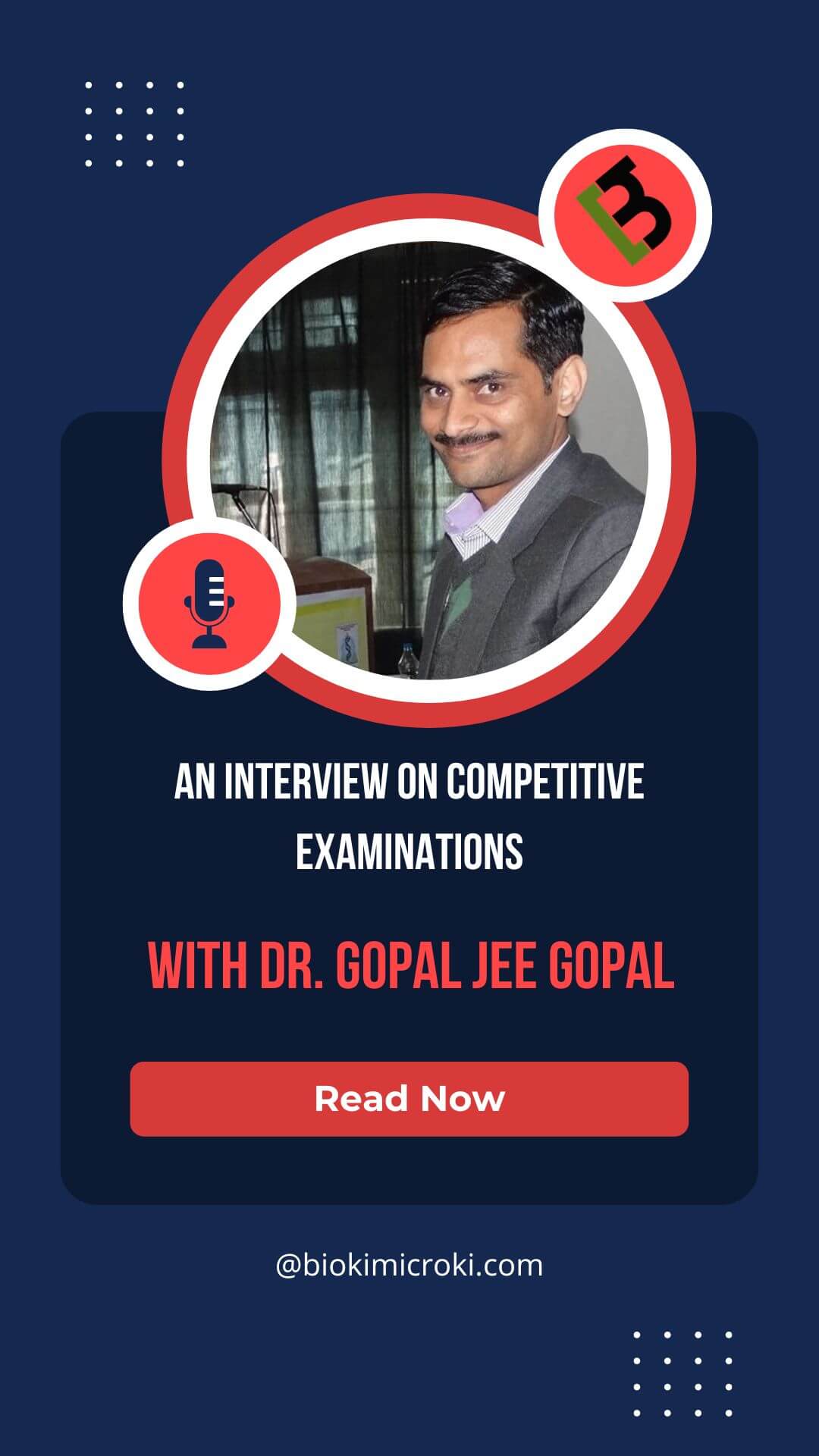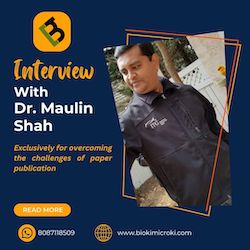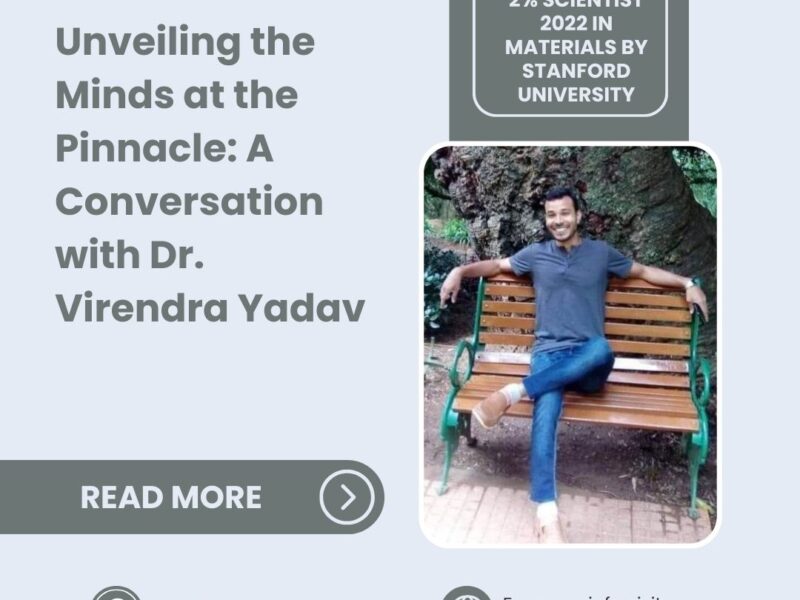Competitive Examinations at National level checks our fundamentals and eligibility for future career. Understanding the need of guidance in this area we have conducted this very informative Interview for our readers.
Dear Readers!
I am Sana and today we have with us Dr. GopalJeeGopal, Professor at C.G Bhakta Institute of Biotechnology. He is also an expert of National level Competitive Examinations like CSIR-UGC-NET/ GATE / IIT-JAM etc. On behalf of my team, I would to thank Dr. Gopal Jee Gopal for accepting our request and sharing his knowledge and experience with us.
Brief Profile of Dr. Gopal Jee Gopal –
Dr. Gopal Jee Gopal, Assistant Professor at Dept. of Biotechnology, Uka Tarsadia University(UTU), has done his PhD from Special Centre For Molecular Medicine, Jawaharlal Nehru University(JNU), New Delhi. He is working on Plastic degrading Enzyme for which Gujarat state Biotechnology Mission has sanctioned a research grant. He was awarded a research project under Fast track Young Scientist Scheme by Department of Science and Technology (DST), Govt of India. He has also been awarded Dr. D.S. Kothari Postdoctoral fellowship ( U.G.C. Scheme). He has also qualified Junior research Fellowship ( CSIR NET-JRF) in Life-science. Dr. Gopal has published his research and Review paper in National and International Journals of repute. He has delivered more than 130 invited lectures on his research work as well as research opportunities available for Young Researchers at different institutes/Departments/colleges in India. He has also delivered invited talk in several international and national conferences. He has lead several organisations at JNU, New Delhi and participated as invited speaker in many debates including the debate organised by BBC London and other news channels of India. He is also working as an advisor of few private limited companies and proprietorship firms like Genexplore diagnostic and research Pvt. Ltd, Ahmedabad, DNAxpert Pvt LTD, Vishakha Pattanam and Drishti Creative Pvt. LTd, Delhi. He is Coordinator of Network of capacity Building cell (GSBTM) of South Gujarat region. He has conducted 23 batches of Online course (30-36 hours duration) in Recombinant DNA Technology and 5 Batches of Online Course in Basics of Genomics and Proteomics (course duration is 30 Hours) in which more than 2100 Graduate and Post graduate students, Research Scholars, Faculties and Scientists from across the nation and overseas.
Sana: Sir, you have tremendous experience in training the students for National Level Competitive Examinations it would be great to receive your pearls of wisdom.
So shall we proceed with the interview?
Dr. Gopal Jee Gopal: Yes , Please
Sana: So, my first question would be, what are the different National Level Exams that a student can prepare?
Dr. Gopal Jee Gopal: B.Sc. Students of Bioscience streams may appear in
- GAT-B ( Graduate aptitude test of Biotechnology) Exam conducted by Regional Center for Biotechnology.
- IIT Jam Exam conducted by IIT.
- JGEEBILS ( conducted by TIFR).
- CU- ET( Common University entrance test) etc. Several central universities and premier institutes conduct their own entrance examinations for PG programme.
M.Sc. Students of Bioscience stream may appear in
- CSIR-UGC Combined NET-JRF Exam (This examination has three category, NET-LS, NET-JRF and SPMF)
- BET Exam sponsored by Department of Biotechnology ( It also gives JRF).
- ICMR– JRF Exam sponsored by Indian council for Medical Research
- Several premier institutes conduct their own PhD entrance examinations and Provide fellowship to qualified PhD Registered Students.
- PhD pursuing students from premier institute, Like , IIT, IISc., IISER, etc may apply for Prime ministers Research Fellowship(PMRF) through which s/he get 70K-80K per month fellowship if get selected.
- GATE-BT and GATE-XL: GATE score and qualification is also considered for admission in PhD programme by few institutes and given priority in Project- JRF position.
MSc. Pass students ( if wish to pursue PhD) may also avail fellowship without competitive examination.
- Direct SRF: PhD pursuing students with 2 years of research experience may apply for direct SRF of CSIR.
- Inspire Research Fellowship( JRF): University toppers( in postgraduation) may directly apply under this scheme to receive JRF.
- Different categories( Sc, ST, OBC and Minority community) of students have different schemes to avail fellowship during PhD.
- Some state also gives fellowship to PhD students, like Gujarat Govt. gives Sodh Fellowship (15K Per month for Two years) to PhD students of Gujarat.
Sana: What is the purpose of the National Level Competitive Examinations like CSIR NET, TIFR, ICMR and JNU?
Dr. Gopal Jee Gopal: CSIR/UGC- NET LS (Lecturership) qualification is required as minimum eligibility to teach in colleges and university as per Govt. norms. NET- JRF( Junior Research Fellowship) qualified students gets Fellowship( 31000 per month plus HRA and Contigency amount Rs. 2000 per annum) from CSIR or UGC if registered for PhD anywhere in India. JRF qualified students are eligible for Lectureship also. 10 top JRF students in LifeScience also get Shyama Prasad Mukherjee fellowship(SPMF). SPM fellowship is more than the JRF fellowship. ICMR and DBT also conduct JRF exam and provide fellowship to selected students. TIFR conduct PhD or Integrated PhD entrance exam and gives fellowship to selected students. Earlier, JNU used to conduct CEEB Exam (combined entrance exam for biotechnology for giving admission in postgraduate courses in Biotechnology) on behalf of department of Biotechnology, Govt. of India. Now this Exam is conducted by NTA on behalf of DBT-RCB.
There is no entrance exam for taking admission in most of the private universities and state universities so selection of students for providing fellowship and giving admission in top institute is essential. Entrance exam is required to select/screen few students from all degree holders because opportunities are very less in comparison to the total number of degree holder students.
Sana: What are the new opportunities a candidate can receive after qualifying the National level Competitive exams?
Dr. Gopal Jee Gopal: They will get following benefits if they get admission in premier institute for post graduate programme.
- Get opportunity to learn from top class teachers.
- Get access to good research infrastructure.
- Will be a brand ambassador of your institute( present host institute)
- Get competitive environment because everybody have joined there through competitive exams.
- Get Fellowship ( Rs. 5000-31000 pm).
- Chances of becoming successful scientist will be more.
Sana: Students strongly believe that CSIR-NET is a very difficult Exam, is it correct?
Dr. Gopal Jee Gopal: Hahaha, I don’t think so. People like me if qualified CSIR NET JRF and JNU entrance exam with all India Ist rank then anyone can qualify CSIR NET exam. Most of the students fear CSIR-NET because they directly appear for NET exam. They have never appeared and prepared for any of the national level competitive examinations like, NEET, Navodaya Vidhyalay, NTSE, GAT- B etc. So NET exam seems hard for these type of students. But this fear can easily be overcome by looking at previous years’ question paper during preparation.
Sana: How should we prepare for the National Level Competitive Examinations?
Dr. Gopal Jee Gopal: For Preparation, They should start with Class XI and XII syllabus of NCERT/CBSE. They should start to solve NEET previous years’ questions, GAT B previous years questions etc. and then previous years question of NET examination. Most of the Syllabus/content of CSIR NET, BET, ICMR-JRF examinations are overlapping. Once they start preparing for CSIR NET, they should also apply for these examination.
Sana: Can you please share some Do’s and Don’ts for competitive examinations preparation?
Dr. Gopal Jee Gopal: They should not opt for short -cut. They should not start with solving questions using trick in initial phase. Students should prepare for basic Chemistry and Mathematics ( Generally, Biologists ignore these subjects). Basic understanding of Chemistry and mathematics give advantage over other biology students in qualifying these national level competitive examinations.
Sana: Do you think the NET aspirant should join the coaching classes?
Dr. Gopal Jee Gopal: No need to join coaching classes. I have not joined any coaching classes for the preparation of CEEB or CSIR NET exam but qualified both. Students should starts with easy and common topics first and then they may take guidance/coaching/tuition for some difficult topics.
Sana: Any other pearl of wisdom would you like to share with our readers?
Dr. Gopal Jee Gopal: Good Students should have following characteristics. The can try to inculcate these if they don’t have.
Kaak Cheshta ,Bako Dhyanam.
Swan Nindra Tathaiwcha. Alpahari, Grihtyagi
Vidhyarthi Panch Lakshnam!
And they should also remember
Sukharthinah kuto Vidya,Vidhyarthinah Kutah Sukham
Sukharthi Wa Tyajetvidya, Vidyarthi va Tyajet Sukham.
Dr. Gopal Jee Gopal: Students may connect with me through my social sites or my whatsapp number, 9558880617 for more guidance and clarification.
Sana: I am really grateful to have you on biokimicroki platform. Thank you so much Dr. Gopal Jee Gopal Sir for sharing your valuable knowledge and experience with our readers.
Readers, You can follow Dr. Gopal Jee Gopal on his LinkedIn profile too. I am sharing the link for your reference.
https://www.linkedin.com/in/gopal-jee-gopal-a2312529/?originalSubdomain=in
Readers are welcome to post their question and feedback in the following comment box.


